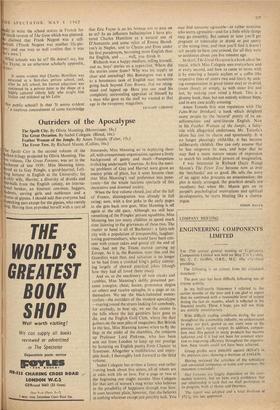Outriders of the Apocalypse
he Spoilt City is the second volume of the alkan trilogy projected by Olivia Manning. The st volume, The Great Fortune, was set in the ucharest of late 1939: Miss Manning intro- ced us to Guy Pringle, a good-hearted, Lett- ing lecturer in English at the University; his Ickly wife, Harriet; a diversity of drunks and d-balls from the English colony, an interna- nal banker, an itinerant con-man, beggars,
1 'dents, serving girls and noblemen and a orus of gipsies. I should add that everyone had lisPeaking part except for the gipsies, who merely 118. Having thus provided herself with a cast of thousands, Miss Manning set to deploying them all, with consummate organisation, against a lively background of gaiety and death—Pornpeians frolicking underneath Vesuvius. At first the mari- tal problems of Guy and Harriet were given an uneasy pride of place, but it soon became clear that Miss Manning's real preference was pano- ramic—for the whole luscious spectacle of this decorative and doomed society.
When the first volume closed, just after the fall of France, disintegration was already in full swing; now, with a few jerks in the early pages as she gets back into gear, Miss Manning is off again at the old pace. Although we still hear something of the Pringles' private squabbles, Miss Manning has too many children to spend much time listening to the grievances of these two. The matter to hand is all of Bucharest : a fairy-tale city with a population of irresponsible, laughter- loving gourmandisers, who would have been con- tent with cream cakes and gossip till the end of time, had not the Titans started carving up Europe. As it is, the Russians want this and the Guardists want that, and salvation is no longer to be had from a crooked king's policy consist- ing largely of shrewd practical jokes (though how they had all loved them once).
And so, as the machinery of ruin creaks and rumbles, Miss Manning's deftly presented per- sonne conspire, cheat, booze, pronounce elegies on others and receive epitaphs, in a page or so, themselves. We see the black-helmeted motor- cyclists—the outriders of the modern apocalypse --roaring round the streets looking for somebody, for anybody, to beat up; we see the casino in the hills where the last gamblers have gone to die, and the English Golf Club, where the dust gathers on the neat piles of magazines. But British to the last, Miss Manning knows when to fly the flag; in the midst of the shambles, she conjures up Professor Lord Pinkrose, who has been sent out from London to keep up our prestige by lecturing on English poetry from Chaucer to Tennyson. Altogether a multifarious and enjoy- able book; I thoroughly look forward to the third volume.
Isabel Colegate has written a funny and rather moving book about five sisters, all of whom are at odds with life or love. For a page or two at the beginning one might mistake Miss Colegate for that sort of women's mag writer who believes in the possibility of happiness through true love. It soon becomes plain, however, that she believes in nothing whatever except just possibly luck. You
may find someone agreeable—or rather someone who seems agreeable—and for a little while things may go smoothly. But sooner or later you'll get pregnant or tubercular or drunk or just spotty v. the wrong time, and then you'll find it doesn't suit people to have you around, for all they were so assiduous about you five minutes ago.
In short, The Great Occasion is a book about be- trayal, which Miss Colegate sees everywhere and at every second, and how to come to terms with it by entering a lunatic asylum or a coffin (the respective fates of sisters two and four); by seek- ing compensation in greed (sister one) or in drink (sister three); or simply, as with sister five and last, by making your mind a blank. This is a gloomy book, then, but not entirely without hope, and in any case acidly amusing.
Amos Tutuola first won reputation with The Palm-Wine Drinkard, a book which delighted many people by the 'natural' poetry of its un- selfconscious and semi-literate English. Now in his Feather Woman of the Jungle, a fairy- tale with allegorical undertones. Mr. Tutuola's idiom has lost its charm and spontaneity. It is no longer pleasingly child-like, it has become deliberately childish. One can only assume that he has outgrown its uses, and hope that he may find a more mature means of expression to match his undoubted powers of imagination.
I was interested in Richard (Suzie Wong) Mason's The Fever Tree because now as ever his `mechanics' • are so good. He tells the story of an agent who procures an assassination; the plot is nicely arranged, the practical details are excellent; but when Mr. Mason gets on to people's psychological motivations and spiritual developments, he starts bleating like a cinema- organ.
SIMON RAVEN






































 Previous page
Previous page